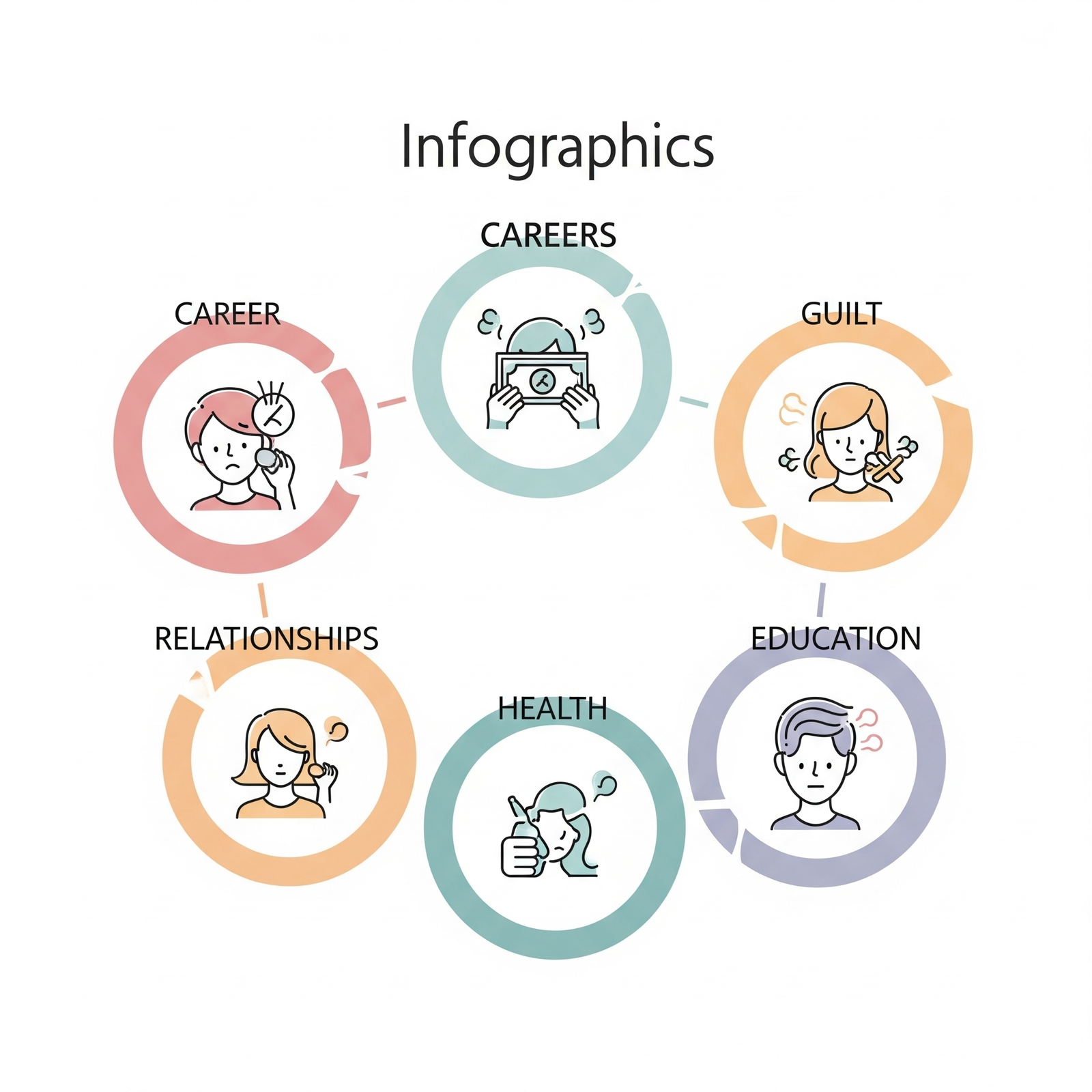Three years ago, when I got my biggest promotion yet at 32, I should have felt on top of the world. Instead, I found myself lying awake at night, consumed by an overwhelming sense of guilt. The success guilt in my 30s that I experienced caught me completely off guard – here I was, achieving everything I’d worked toward, yet feeling terrible about it.
If you’re reading this, chances are you understand that familiar knot in your stomach when good things happen to you. You might find yourself downplaying achievements, feeling undeserving of recognition, or even sabotaging opportunities because success feels somehow “wrong.” I’ve been there, and I want you to know that what you’re experiencing is more common than you think.
My Battle with Success Guilt
When I landed that dream job with a six-figure salary, my first instinct wasn’t celebration – it was panic. I immediately started thinking about my college friends who were still struggling to find stable work, my parents who never had opportunities like this, and whether I somehow didn’t deserve what I’d achieved.
The guilt manifested in strange ways. I’d avoid posting about work accomplishments on social media, I’d deflect compliments by crediting luck rather than effort, and I even found myself working twice as hard to “prove” I deserved my position. What I didn’t realize then was that this guilt was undermining my success and affecting my mental health.
Research shows that the impostor phenomenon can favor failures and support a scarce perception of one’s competence in order to protect social relations, which perfectly described my experience. I was unconsciously sabotaging myself to maintain a connection with others.
Understanding the Psychology Behind Success Guilt

Through months of research and self-reflection, I discovered that success guilt often stems from deep-rooted beliefs about worthiness, fairness, and belonging. Success guilt is a discomfort we experience when our achievements set us apart from other people around us, and this separation anxiety becomes particularly acute in our 30s when we’re more aware of life’s inequalities.
The 30s represent a unique psychological moment. We’re old enough to recognize systemic inequalities and personal privileges, yet young enough to still be building our identity around achievement. This awareness creates a perfect storm for success guilt to flourish.
What surprised me most was learning that success guilt often coexists with impostor syndrome. While impostor syndrome makes us feel like fraud, success guilt makes us feel like we don’t deserve our achievements even when we know we’ve earned them. It’s a double burden that many high achievers carry silently.
The Hidden Costs of Success Guilt
Living with success guilt cost me more than I initially realized. Beyond the obvious emotional toll, I noticed several concerning patterns developing:
Professional Self-Sabotage: I started turning down speaking opportunities, avoiding leadership roles, and minimizing my contributions in meetings. My guilt was limiting my potential.
Relationship Strain: I became hypervigilant about not appearing “too successful” around friends and family, which created artificial barriers in my relationships.
Imposter Syndrome Amplification: The guilt fed into my existing impostor syndrome, creating a cycle where I questioned both my worthiness and my competence.
Physical Symptoms: The stress of carrying guilt about my achievements manifested as headaches, sleep problems, and constant fatigue.
Understanding these costs was my wake-up call. I realized that my success guilt wasn’t just a personal quirk – it was actively harming my life and career trajectory.
Why Success Guilt Hits Differently in Your 30s
The 30s bring unique challenges that make success guilt particularly intense:
Peer Comparison Amplification: Social media makes it impossible to ignore how your success compares to others. Every promotion announcement feels like a potential source of guilt when you see friends struggling.
Family Expectations: You may have surpassed your parents’ achievements, creating complex feelings about leaving your family’s socioeconomic “pack.”
Survivor’s Guilt: Many 30-somethings experience survivor’s guilt when they succeed while friends face job losses, relationship failures, or financial struggles.
Awareness of Privilege: A greater understanding of systemic advantages can make achievements feel less “earned” and more “lucky.”
Identity Crisis: Success might conflict with earlier self-concepts or family narratives about who you’re “supposed” to be.

The Most Common Types of Success Guilt I’ve Encountered
Through my research and conversations with others facing similar struggles, I’ve identified several distinct types of success guilt:
Financial Guilt: Feeling bad about earning more than friends, family, or societal averages. This was my primary trigger – every paycheck felt like evidence of my privilege rather than a reward for hard work.
Achievement Guilt: Feeling undeserving of recognition, awards, or professional accomplishments. I used to cringe when colleagues congratulated me on wins.
Opportunity Guilt: Feeling guilty about having access to opportunities others don’t. This became particularly intense when I realized how my background had opened doors for me.
Happiness Guilt: Feeling bad about being happy or content when others are struggling. This extended beyond professional success to personal life satisfaction.
Intelligence Guilt: Feeling bad about natural abilities or educational advantages. I found myself hiding my academic background in certain social situations.
Real People, Real Experiences: Community Insights on Success Guilt

My research across forums revealed that success guilt is incredibly common, though rarely discussed openly. One Quora user reflected: “Sometimes I ask myself the same question; why do I have so many things that other people don’t? I am not referring to special things, because just being healthy is something many people would desire”, showing how even basic advantages can trigger guilt.
Another community member shared: “One of the most comforting words a classmate can say to me is ‘I haven’t started the project either.’ The feeling of sameness just feels good, and being in a different position can evoke emotions of being outcasted or alone”. This perfectly captures the isolation that success can create.
What struck me most was how many people described feeling like they needed to hide their achievements or downplay their success to maintain relationships. The fear of being seen as “different” or “better than” others drives much of our success guilt.
My 5-Step Framework for Overcoming Success Guilt
After two years of working through my success guilt, I developed a framework that transformed my relationship with achievement:
| Step | What I Did | Why It Helped |
|---|---|---|
| 1. Acknowledge the Guilt Without Judgment | I observed my guilt without pushing it away, asking where it truly came from. | Helped me uncover childhood beliefs and start healing with self-compassion. |
| 2. Separate Privilege from Personal Effort | I accepted my advantages and honored my hard work. | Allowed me to own my success without shame or defensiveness. |
| 3. Reframe Success as Responsibility | I began seeing success as a tool to uplift others and give back. | Turned guilt into purpose, making success feel meaningful and empowering. |
| 4. Build a Support Network | I connected with fellow achievers who understood the same struggles. | Reduced feelings of isolation and helped me see my achievements as valid and shared. |
| 5. Practice Gratitude Without Guilt | I focused on being thankful without letting guilt sneak in. | Reinforced a healthier emotional response to success and deepened my sense of fulfillment. |
Practical Strategies That Work
Beyond my framework, I developed specific daily practices that helped reduce success guilt:
The Achievement Journal: Every week, I write down three accomplishments and the specific efforts that led to them. This helps counter the narrative that my success is purely luck-based.
The Impact Inventory: I regularly document how my success enables me to help others – whether through mentoring, charitable giving, or creating opportunities for others.
The Privilege Acknowledgment Practice: Instead of feeling guilty about advantages, I acknowledge them explicitly and consider how to use them responsibly.
The Comparison Detox: I limit social media exposure and avoid situations that trigger unhealthy comparisons with others’ struggles.
The Success Sharing Strategy: I learned to celebrate achievements publicly, which helped normalize success and inspired others rather than making them feel bad.

The Role of Family and Background in Success Guilt
One of my biggest revelations was understanding how family dynamics contributed to my success guilt. Many of us come from backgrounds where standing out was discouraged, either explicitly or implicitly. Messages like “Don’t get too big for your britches” or “Remember where you came from” can create internal conflict when we achieve success.
For me, being the first in my family to reach certain professional milestones created a complex mix of pride and guilt. I felt like I was somehow betraying my roots by succeeding beyond my family’s expectations. Working through this required honest conversations with family members and reframing my success as honoring rather than abandoning my background.
The key insight was that my success doesn’t diminish my family’s worth or achievements. It’s often a direct result of the values and work ethic they instilled in me. Reframing success as a continuation of family values rather than a departure from them was transformative.
Dealing with Success Guilt in Relationships

Success guilt can significantly impact personal relationships, creating distance and misunderstanding. I’ve learned several strategies for maintaining healthy relationships while managing success guilt:
Transparent Communication: I started having honest conversations with friends and family about my success and the guilt I felt. Many were surprised to learn about my internal struggle and were supportive once they understood it.
Shared Celebration: Instead of hiding achievements, I began sharing them in ways that celebrated collective success rather than individual superiority. For example, thanking mentors and supporters when announcing promotions.
Mutual Support: I focused on being equally enthusiastic about others’ successes, creating a culture of shared celebration rather than competition.
Boundary Setting: I learned to set boundaries around discussions of success and money, redirecting conversations that became uncomfortable or guilt-inducing.
The Connection Between Success Guilt and Mental Health
What I didn’t initially realize was how deeply success guilt was affecting my mental health. Despite achieving success, people may experience deep dissatisfaction, sometimes engaging in self-destructive behaviors or experiencing mental health challenges such as anxiety and depression.
The constant internal conflict between achievement and guilt was exhausting. I found myself oscillating between pride and shame, creating emotional whiplash that impacted my overall well-being. Professional counseling helped me understand that success guilt was a form of self-punishment that served no constructive purpose.
Working with a therapist who specialized in high achievers was crucial. They helped me understand that success guilt often masks deeper issues around self-worth, family loyalty, and identity. Addressing these root causes was essential for lasting change.
Success Guilt in Different Areas of Life
I discovered that success guilt manifests differently across various life domains:
Career Success: Promotions, salary increases, and professional recognition often trigger the most intense guilt, especially when compared to peers.
Financial Success: Money guilt can be particularly challenging, affecting spending decisions and financial planning.
Relationship Success: Feeling guilty about happy relationships when others are struggling with loneliness or relationship problems.
Health Success: Even maintaining good health or fitness can trigger guilt when others face health challenges.
Educational Success: Academic achievements or degrees can create guilt, particularly for first-generation college graduates.
Understanding these different manifestations helped me develop targeted strategies for each area rather than trying to apply one-size-fits-all solutions.

Building a Healthy Relationship with Success
The ultimate goal isn’t to eliminate all feelings about success but to develop a healthy, balanced relationship with achievement. This means:
Accepting Complexity: Success can simultaneously be earned and privileged, individual and supported by others, celebrated and handled with humility.
Embracing Responsibility: Success comes with the responsibility to use it well, but not the obligation to feel guilty about it.
Maintaining Perspective: Individual success exists within larger systems and contexts, but that doesn’t negate personal effort and achievement.
Staying Connected: Success shouldn’t isolate us from others, but it may change relationship dynamics in ways that require conscious management.
Continuing Growth: Success is not a destination but an ongoing journey that requires continuous learning and adaptation.
Top Reddit and Quora Questions About Success Guilt
From r/successful: “Does anyone else feel guilty about their success while friends struggle?”
Top Answer (1.8k upvotes): “Absolutely. I got a huge promotion last year while my best friend was laid off. I felt terrible celebrating while he was job hunting. But my therapist helped me understand that my success doesn’t cause his struggles, and feeling guilty doesn’t help either of us. Now I focus on how I can support him instead of feeling bad about my situation.”
My Experience: This perfectly captures the essence of success guilt. Learning to channel guilt into constructive support for others was a game-changer for me.
From Quora: “Is it normal to feel guilty for being successful when your family never was?”
Popular Answer (934 likes): “It’s extremely normal and shows your empathy and connection to your roots. But remember that your success can inspire and create opportunities for your family too. You don’t honor your background by limiting yourself – you honor it by using your success to lift others.”
Personal Insight: This was exactly my struggle. I learned that my success could be a bridge rather than a barrier between me and my family.
From r/careerguidance: “I feel like a fraud even though I earned my promotion legitimately”
Highly Upvoted Response (2.3k upvotes): “Impostor syndrome and success guilt often go hand in hand. You can logically know you deserve something while emotionally feeling like you don’t. The key is recognizing that feelings aren’t facts. Your promotion was based on your performance, not luck or politics.”
My Take: Separating logical knowledge from emotional feelings was crucial in my journey. Both can exist simultaneously without invalidating each other.
From Quora: “How do I stop feeling guilty about making more money than my parents ever did?”
Thoughtful Response (567 likes): “Your parents likely sacrificed so you could have opportunities they didn’t. Feeling guilty about succeeding beyond their achievements dishonors their sacrifice. Instead, feel grateful and use your success to care for them and create opportunities for others.”
How This Helped Me: Reframing my success as honoring rather than betraying my parents’ sacrifices was transformative. It changed guilt into gratitude.
From r/personalfinance: “I feel guilty about my high salary when others are struggling financially”
Top Comment (1.9k upvotes): “Your salary is compensation for the value you provide. Feeling guilty doesn’t help anyone who’s struggling financially, but using your resources wisely can. Consider charitable giving, mentoring, or supporting local businesses if you want to address income inequality constructively.”
My Application: This helped me understand that guilt without action is unproductive, while action without guilt is powerful.
FAQs
Is success guilt a real psychological condition?
While not officially classified as a disorder, success guilt is a well-documented psychological experience that affects many high achievers. Research shows connections between guilt over success, impostor syndrome, and self-sabotaging behaviors, confirming its legitimacy as a psychological phenomenon.
Why do I feel guilty about success when I worked hard for it?
Success guilt often stems from deep-rooted beliefs about worthiness, fairness, and social connection. Even when we logically know we've earned our achievements, emotional patterns established in childhood can create guilt responses that override rational thinking.
How long does it take to overcome success guilt?
This varies significantly based on individual circumstances and the depth of underlying beliefs. In my experience, noticeable improvement came within 3-4 months of consistent work, but fully transforming my relationship with success took about two years.
Can success guilt harm my career?
Absolutely. Success guilt can lead to self-sabotage, avoiding opportunities, downplaying achievements, and limiting professional growth. People with impostor syndrome often overwork to compensate for feeling like frauds, which can lead to burnout and reduced effectiveness.


